Related Research Articles

Everhardus Johannes Potgieter was a Dutch prose writer and poet, who was born at Zwolle in Overijssel.
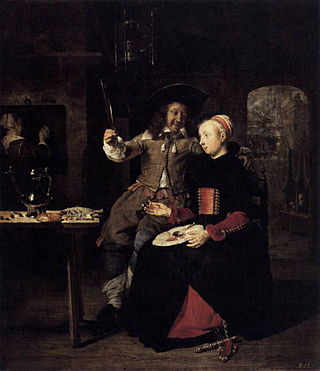
Gabriël Metsu (1629–1667) was a Dutch painter of history paintings, still lifes, portraits, and genre works. He was "a highly eclectic artist, who did not adhere to a consistent style, technique, or one type of subject for long periods". Only 14 of his 133 works are dated.
Tjalie Robinson is the main alias of the Indo (Eurasian) intellectual and writer Jan Boon also known as Vincent Mahieu. His father Cornelis Boon, a Royal Netherlands East Indies Army (KNIL) sergeant, was Dutch and his Indo-European mother Fela Robinson was part Scottish and Javanese.

Pieter van Woensel was a physician, adventurer, travel writer, navy medical officer, political cartoonist and a colourful, atheist author under the Turkish pseudonym Amurath-Effendi Hekim-Bachi in the satirical almanac de Lantaarn. Typical for Van Woensel is his love for the peculiar, dislike for the easy route, and inborn tendency towards the paradoxical.

Gerrit Jan Komrij was a Dutch poet, novelist, translator, critic, polemic journalist and playwright. He rose to prominence in the early 1970s, writing poetry that sharply contrasted with the free-form poetry of his contemporaries. He acquired a reputation for his prose in the late 1970s, writing acerbic essays and columns often critical of writers, television programs, and politicians. As a literary critic and especially as an anthologist he had a formative influence on Dutch literature: his 1979 anthology of Dutch poetry of the 19th and 20th centuries, reformed the canon, and was followed by anthologies of Dutch poetry of the 17th and 18th centuries, of Afrikaans poetry, and of children's poetry. Those anthologies and a steady stream of prose and poetry publications solidified his reputation as one of the country's leading writers and critics; he was awarded the highest literary awards including the P. C. Hooft Award (1993), and from 2000 to 2004, he was the Dutch Dichter des Vaderlands. Komrij died in 2012 at age 68.

The Digital Library for Dutch Literature is a website about Dutch language and Dutch literature. It contains thousands of literary texts, secondary literature and additional information, like biographies, portrayals etcetera, and hyperlinks. The DBNL is an initiative by the DBNL foundation that was founded in 1999 by the Society of Dutch Literature.
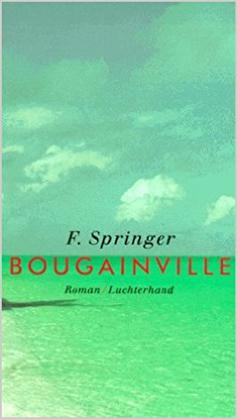
Bougainville: Een gedenkschrift is a novel by Dutch author F. Springer. Published in 1981, it won the Ferdinand Bordewijk Prijs in 1982. The novel is one of the author's most popular and was Springer's first big literary success. It is set in the nineteenth-century Dutch colonial past and contemporaneous Bangladesh, and is based on the experiences of the author, who grew up in the Dutch East Indies and was stationed in Bangladesh as a diplomat.

De Hoop is a smock mill in Holwerd, Friesland, Netherlands which was built in the 1730s and is working for trade. The mill is listed as a Rijksmonument, number 38709.
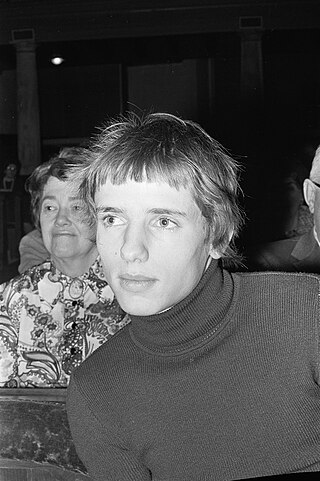
Willem Jan Otten is a Dutch prose writer, playwright and poet, who in 2014 won the P. C. Hooft Award for lifetime literary achievement.

The Bataafs Lyceum is a public high school in Hengelo, Netherlands. The Bataafs Lyceum is part of a public school division called the Openbare Scholengemeenschap Hengelo and offers HAVO and VWO level education.

Van de koele meren des doods is a Dutch novel by Frederik van Eeden, first published in 1900. It is one of the canonical Dutch novels, and is praised for its representation of the female protagonist; the novel established van Eeden as a "master of the psychological novel." A 1982 movie was based on the novel.

Dutch Indies literature or Dutch East Indies literature is the Dutch language literature of colonial and post-colonial Indonesia from the Dutch Golden Age to the present day. It includes Dutch, Indo-European and Indonesian authors. Its subject matter thematically revolves around the VOC and Dutch East Indies eras, but also includes the postcolonial discourse.

Isaac de l'Ostal de Saint-Martin was a French chevalier, who came in an unknown year from the Béarn to the Dutch Republic.
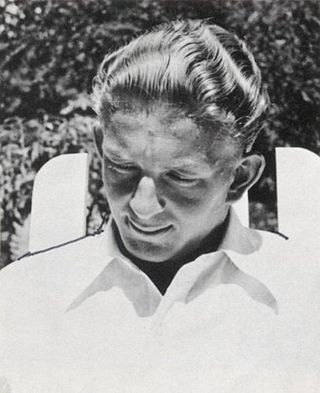
Hans Lodeizen, born Johannes August Frederik Lodeizen, was a Dutch poet. He was the author of one book of poems and a quantity of miscellaneous work. Despite his short life and modest output, his minimalist lyrics, which are generally constituted of short, unrhymed lines without capitals or punctuation, strongly influenced a post-war generation of Dutch poets, including Gerard Reve.
The Abbey of Onze-Lieve-Vrouw ter Nieuwe Plant, formerly also Roesbrugge Abbey is a community of Augustinian canonesses belonging to the Congregation of Windesheim. The sisters are informally known as the Roesbrugge Dames - the Roesbrugge Ladies. Located in Roesbrugge from 1239 to the late 16th century, the community then moved into Ypres, West Flanders, Belgium, where it exists today. Its adjacent school is the Lyceum Onze Lieve Vrouw ter Nieuwe Plant.
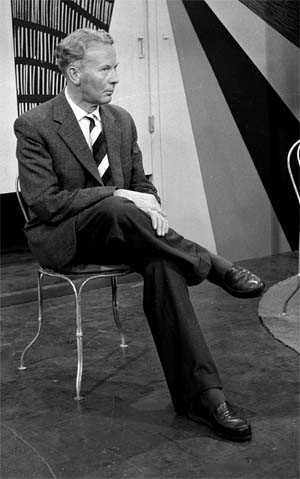
Cornelis Jan (Kees) Stip was a Dutch epigram poet. He wrote under many pseudonyms, most notably Trijntje Fop and Chronos.

Cornelis Bastiaan Vaandrager, who generally published with only his initials as C. B. Vaandrager, was a Dutch writer and poet who lived and worked in Rotterdam. Later he came to be known simply by the shortened version of his name as Vaan.

Marijke Hanegraaf is a Dutch poet. Since 1997, she has lived in Nijmegen; she was the city’s official poet in 2013 and 2014.

Simone Dubois was a Belgian translator, writer and researcher who lived and worked mainly in the Netherlands. She became known in particular for research into and translations of the work of Belle van Zuylen, of whom she wrote two biographies. Dubois devoted 40 years of her life to this French-language writer.
References
- ↑ C. O. Jellema, Cornelius Onno Jellema, Gerben Wynia (ed.). "C. O. Jellema, Cornelius Onno Jellema, Gerben Wynia (ed.) (Author of Een web van dromen - Dagboeken 1960-2003)". Goodreads.com. Retrieved 2014-02-20.
{{cite web}}:|author=has generic name (help)CS1 maint: multiple names: authors list (link) - ↑ "Gerben Wynia - Nederlandse Poëzie Encyclopedie". Nederlandsepoezie.org. Retrieved 2014-02-20.
- ↑ "Gerben Wynia · dbnl". Dbnl.org. Retrieved 2014-02-20.
- ↑ "Personeel". Bataafs Lyceum (in Dutch). Retrieved 11 July 2019.